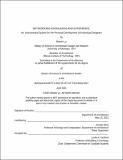| dc.contributor.advisor | Stiny, George | |
| dc.contributor.author | Lu, Bowen | |
| dc.date.accessioned | 2022-01-14T15:07:33Z | |
| dc.date.available | 2022-01-14T15:07:33Z | |
| dc.date.issued | 2021-06 | |
| dc.date.submitted | 2021-07-27T20:21:55.858Z | |
| dc.identifier.uri | https://hdl.handle.net/1721.1/139370 | |
| dc.description.abstract | This research describes a new design thinking technology, which draws knowledge and experience from the learning and ideation of individual designers, and makes this accumulation accessible for future use and inspiration.
Pursuing novelty and diversity, designers are trained through a wide spectrum of different disciplines, requiring a tremendous amount of explicit knowledge and implicit experience. As a result, designers must go beyond the apprentice-based practice long promoted by design education to embrace a more personal exploration of design ideas. However, while a technology surge of computer-aided design (CAD) increases productivity, it limits our imagination to a predefined structure and framework. A technology that facilitates knowledge accumulation and open-ended design ideation is required, especially in long term for individual designers.
In this thesis, I propose a new theory of design ideation representation that integrates combinatory systems of knowledge engineering that extract and simulate symbolic knowledge for decision-making as well as constructive systems of visual calculating that prioritize human visual perception for ambiguous and unrestricted imagination. Based on the integrated theory, I develop a software prototype that augments designers to acquire and take control of their knowledge and experience to generate new, diverse, and creative ideas. I also demonstrate and analyze a constructed knowledge network by the software system and how the system is used in the design process.
This research contributes to a new direction of design technology for ideation as a counterpart of computer-aided design (CAD) technology for productivity. The software prototype inspires new design tools for creative design thinking. It takes one more step towards a promising future of augmented intelligence where more powerful human-computer integration can be actualized. | |
| dc.publisher | Massachusetts Institute of Technology | |
| dc.rights | In Copyright - Educational Use Permitted | |
| dc.rights | Copyright retained by author(s) | |
| dc.rights.uri | https://rightsstatements.org/page/InC-EDU/1.0/ | |
| dc.title | NETWORKING KNOWLEDGE AND EXPERIENCE: An Instrumental System for the Personal Development of Individual Designers | |
| dc.type | Thesis | |
| dc.description.degree | S.M. | |
| dc.contributor.department | Massachusetts Institute of Technology. Department of Architecture | |
| mit.thesis.degree | Master | |
| thesis.degree.name | Master of Science in Architecture Studies | |
